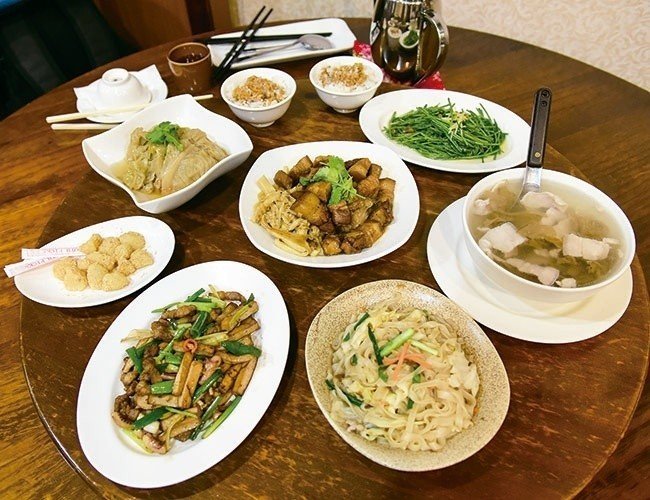Many of Kaohsiung's Hakka residents originally came from Taoyuan, Hsinchu, Miaoli, Taichung and Pingtung. They began migrating to Kaohsiung when the port was being constructed and there was a high demand for skilled labor. Today, many of these Hakka residents still live in the Meinong, Liouguei, Shanlin and Jiasian, which are districts that represent a variety of regional cultures. Over the years, the number of Hakka residents has increased and a distinct culture and cuisine still thrives.  When the Hakka people first settled in the area, they either worked in agriculture or as laborers in the surrounding region. The jobs required a lot of physical labor; therefore, Hakka cuisine is heartier and cooked with fattier meats. It is designed to restore stamina and reflects the local lifestyle in many ways. In Kaohsiung, the Hakka people were forced to live on the sides of the mountains and hills; therefore, they had to get meat from poultry, cattle or wild animals. They also ate a lot of rice, sweet potato, tofu and a variety of pickled vegetables such as Chinese mustard leaves and jade radish. This delicious cuisine has become famous throughout Taiwan. ※ Braised Pork Shank Braised pork shank and pork belly is considered to be the Hakka regional signature dish. Chefs have worked on refining it over the years. The dish is made in a covered pot, with the braised pork stewed in soy sauce and rice wine. The pork is ready to serve when the broth has flavored the meat, and it has turned brown in color. The delicious pork becomes tender, savory and succulent, and the fat melts in your mouth. One of Meinong's local artists, Ms. Jhong Shun-wun states Hakka residents like braised pork shank so much that it has become a crucial traditional dish that is always served during Lunar New Year family feasts. It is the ultimate comfort food of Hakka cuisine. ※ Hakka-style Stir-fry with Pork and Squid Stir-fry with pork and squid is a Hakka dish that is customary during religious feasts. The Hakka people have traditionally been farmers. It is often made for dedication ceremonies that pay respect and gratitude toward their deities, with the hopes that they will bring forth a successful harvest. These thanksgiving ceremonies take place when the Hakka farmers sow the seeds and then again during harvest. Some of these cycles run in conjunction with major holidays such Lunar New Year. During these ceremonies dishes have to be first offered to the gods. Therefore, the dishes still had to last longer, so they would still taste good after it had been set out for long periods of time. The Hakka people found stir-frying the pork and squid, would keep it fresh, tasty and flavorful. Stir-fried pork and squid is fried in a pan with sliced pork belly, extra-firm, block tofu, thin strips of dried squid, chopped garlic, scallions, red peppers that are cooked in rice wine and soy sauce. Since this dish has been widely adopted in Taiwan, each chef has their own interpretation. It is usually enjoyed with a bowl of rice. ※ Hakka Rice Cake In the Hakka culture, rice is considered to be staple food. They have even developed variations of it, such as grinding it into flour or turning it into rice milk. They also continue to make ancient traditional snacks with it, such as Red Tortoise Cake (rice cake), steamed cake and glutinous rice cake. According to Hakka custom, Red Tortoise Cake is also known as new born baby rice cake. Since they are traditionally an agrarian culture, males are considered to be the main contributors to the labor intensive farming. Therefore, whenever a family has a baby boy, the family puts out new born baby rice cakes as an offering during the next Lantern Festival. This is done in hopes that the deities will protect the health of the baby. The family then distributes the new born baby rice cakes to relatives and friends. Hakka cuisine is unique and delicious. Its rich ingredients have energized hard working farmers and visitors alike. It literally epitomizes hardship and the Hakka people's distinct culture. Tasty Hakka cuisine ▲Lin's Hakka Flat Rice Noodle No. 25 Meising Street, Meinong District, Kaohsiung City Tel: (07) 681-3147 Open: 10:00- 21:00 ▲A-cheng Flat Rice Noodle No. 412 Jhongshan 2nd Road, Meinong District, Kaohsiung City Tel: (07) 681-7370 Open: 07:00- 19:00 (closed Tuesdays) ▲Jiajhen Hakka Cuisine No. 308 Jianguo 1st Road, Lingya District, Kaohsiung City Tel: (07) 238-1766 Open: 11:00- 14:00; 17:00- 21:00 ▲Liouduei Hakka Cuisine No. 63 Luoyang St., Sinsing District, Kaohsiung City Tel: (07) 237-5433 Open: 11:00- 14:00; 17:00- 21:00 | 

沒有留言:
張貼留言